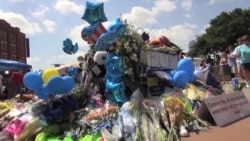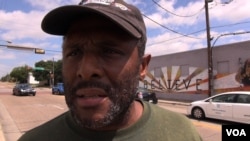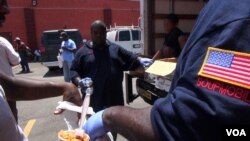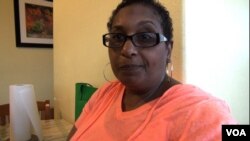As Dallas mourns for five police officers killed last week by a sniper, the minority community of South Dallas also grieves for the officers, and for two African Americans killed by police in Louisiana and Minnesota. South Dallas residents say relations between their community and police could be better.
The Dallas shooting came during a peaceful protest by the Black Lives Matter movement. Micah Johnson, a former U.S. Army reservist, opened fire on the officers, killing five and wounding nine, as well as two civilians.
“It was wrong on both sides,” said Byron Evans, a South Dallas homeless man who spoke at the intersection of two streets named for two prominent African Americans, civil rights leader Martin Luther King, Jr. and black rights activist Malcolm X. A mural picturing both stands at the corner.
Evans said he'd had encounters with disrespectful police, and speaking of all the shootings, he said that “none of this seems right."
At a South Dallas restaurant called Elaine’s Kitchen, people also had mixed feelings.
“And it’s a mixed feeling because you see things that are wrong going on both sides,” said diner Conrad Proctor.
'That's their job'
Outside a nearby community center, however, the police were respected.
“They say, ‘Stop,’ I stop,” said James Wilson. “You know, that’s their job — to protect themselves, too.”
Said Leon Kraut, “I don’t have anything against the police. If there wouldn’t be no police, we’d be in trouble, wouldn’t we?” He said there were good and bad members on every police force, as in every profession.
Dallas Police Chief David Brown, who is African-American, has been praised for his efforts to reach out to minority citizens through community policing, by putting more officers on the street.
But people worry about encounters with police.
“I’ve got to drive right now when I leave here,” said Tayron Palmer as he finished lunch in a local restaurant. He questioned what to do if police should stop him. “If I want to get out of the car, I might get shot,” he said. “If I want to call 911 [the emergency response number], I might get shot. So what do I do?”
Unemployment is high in minority neighborhoods. Among African-Americans across the U.S., it was 8.6 percent in June, compared with the national figure of 4.9 percent.
Call for communication
Outside the Dallas International Street Church in South Dallas, the unemployed come for food, regardless of their race.
“Love is not a color,” said church worker Shedrick Ward. “Love is not black, brown, green, orange. Love is love. God wants us to love one another. That’s what the Bible says.”
All of Dallas is hurting, and “we’ve got to come together,” said South Dallas resident Marcus Williams. “We’ve got to sit down and talk. We’ve got to communicate. Without communication, we’ve got nothing.”
Denise Boothman, another resident of South Dallas, said that “black, white, brown, whatever your race, whatever your creed, whatever your religion, we all have to take part” in the search for solutions.
That's the first step, they say, toward healing a wounded city and nation.














